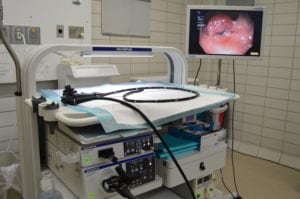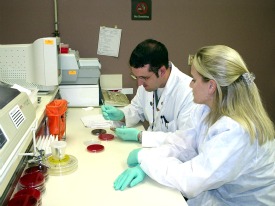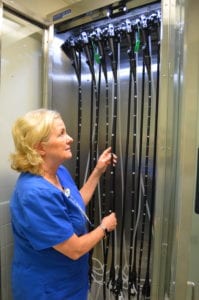Surgical Services
Your Surgical Experience: Created to guide you and provide peace of mind about your upcoming surgery. Please read this carefully as the instructions will help you move smoothly through each phase of your surgery and recovery.
Our goal is to provide you with respectful, compassionate, quality care, while helping our patients achieve greater peace of mind. Abbeville General offers a wide range of surgical services, right here, close to home and family. We focus on our patients’ needs, and reaffirm our commitment to the community that we serve.
Abbeville General is fortunate to have many physicians who are skilled at both minimally invasive and traditional surgical procedures. Our experienced surgeons are teamed with a competent and well-trained surgical services staff, including anesthesiologists and certified registered nurse anesthetist, who are committed to your excellent surgical experience. Many of our surgical services staff hold advance certifications in their specialties, including our RNs in Outpatient Surgery, Operating Room, and Post-Anesthesia Care, as well as our LPNs, Surgical Technologists and Central Sterile Services staff.
With four Operating Suites, one Minor Procedure Suite, an Endoscopy Suite, a Post-Anesthesia Care Unit (PACU), a Day Surgery/Outpatient unit, and a Holding area, we offer a wide variety of services, including minor procedures, bone marrow biopsies, inpatient surgeries, and outpatient surgeries.
Due to technical advances and new, minimally invasive procedures in the operating room, the majority of our patients have same day surgery and are able to return home shortly after surgery.
Surgical services are offered Monday through Friday from 7:00 am to 3:00 pm. Emergency, weekend and holiday coverage is on an on-call basis by qualified surgery staff.
We can accommodate most types of surgeries. 
Instructions for Surgery Patients
Welcome to Abbeville General Hospital Surgical Services. Thank you for choosing us for your surgical healthcare needs.
We have created a section of this website to guide you and provide you with peace of mind about your upcoming surgery. Please read this carefully as the instructions will help you move smoothly through each phase of your surgery and recovery.
In order to best meet your pre-admission needs, we would like you to call our Day Surgery/ Outpatient Services department (337) 898-6428 and schedule a Pre-Operative Appointment.
(Click here for directions to our location at 118 North Hospital Drive, Abbeville, LA 70510)
General Preparation
It is very important that you bring all documents given to you by your surgeon’s office, to Day Surgery/Outpatient including: all Physicians Orders, Consents, Lab Work, X-Rays, history and physicals, and any other documents.
Bring all medications you take with you so that the hospital staff can identify the medication name, dosage and frequency you take it. Also include any non-prescription drugs (over the counter medications) that you may be taking including aspirin, vitamins and herbal supplements. This information will help speed up your preadmission process.
Be sure to provide your physician with information regarding all other physicians you are seeing and any past surgery or major illness you have had. Ask your physician if you should stop any aspirin or anti-inflammatory medication prior to your surgery. Nonsteroidal anti-inflammatories and aspirin tend to decrease blood-clotting abilities. Follow your physician’s instructions for stopping these and herbal medications prior to surgery.
Patients who smoke are at a higher risk of developing infections and are advised to stop smoking at least two weeks prior to surgery. To prepare your lungs for anesthesia and to decrease your post-operative surgical risks, we encourage you to talk to a health care professional about ways to quit prior to surgery.
When you speak with the admitting nurse prior to surgery, you will be instructed in home preparation for surgery:
- Wear comfortable clothes. You will be asked to change into a hospital gown.
- Do not wear makeup or mascara and avoid powders, deodorant, lotions and creams before surgery. No nail polish, hair pins, or jewelry.
- You may wear glasses, dentures, and hearing aids before and after surgery. They may need to be removed before going into the operating room. Contact lenses worn before surgery must be removed before entering the operating room.
- Please bring a case for your hearing aids, glasses, and/or contacts.
- Bring any devices you will need after surgery such as crutches or canes.
- If you have an implantable device, such as a pacemaker or AICD, please bring the device information card.
- You may brush your teeth the day of the surgery, but do not swallow any water. Do not chew gum or take breath mints or hard candy after midnight the night before your surgery.
- Shower with the instructed soap, as ordered by your physician, and wash your hair the night before or the morning of your surgery. This helps prevent infections and it will be more comfortable for you if you are not able to bathe for a few days.
- Medications that you are currently taking, what medications you should take the morning of your procedure and which medications should be stopped.
- Arrange transportation home. You must have a responsible adult drive you home or accompany you in a taxi, or your surgery will be canceled.
Arrange for someone to be with you the rest of the day. Have someone else assume the care of those people who are dependent upon you until you fully recover.
Your physician may give you additional instructions regarding diet, enemas or skin preparation. Follow these instructions carefully.
It is very important that you follow the instructions your physician and the nurse have given you about eating, drinking liquids and taking your medications. If you do not follow these restrictions, your surgery may have to be postponed.
If you develop a cold, persistent cough, sore throat, fever, or any other illness within two days of surgery, or have ongoing symptoms from any new episode since your preoperative visit, your surgeon needs to be notified.
Throughout Your Stay – Your Health Care Team
Physicians – The cooperative effort between physicians and other members of your health care team ensures you receive the best possible care. As your care progresses, your physician may consult other physicians.
Nurses– Registered nurses (RNs) and licensed practical nurses (LPNs) plan, deliver and coordinate your bedside care. Nurses work with you and your physician and surgeon to make sure your care needs are met.
Nursing Assistants – Nursing assistants have received training in basic nursing tasks such as personal care and blood pressure monitoring. They assist RNs and LPNs in caring for you.
Case Managers – Case managers are registered nurses who assist in planning and arranging for ongoing care during and following your hospital stay.
Social Workers – A social worker is available to meet a variety of needs, including help with discharge planning and community resource referrals. Social workers can also assist you with long-term care planning and offer support and counseling to patients dealing with a new diagnosis or health-related issues.
 Others – You may meet various laboratory, radiology and support personnel all dedicated to providing you with quality care. All hospital personnel wear a name tag, and we encourage you to ask who they are and what they do.
Others – You may meet various laboratory, radiology and support personnel all dedicated to providing you with quality care. All hospital personnel wear a name tag, and we encourage you to ask who they are and what they do.
Before Your Surgery
The admitting representative will:
- Ask for your birth date, insurance numbers and other finance-related questions.
You may also be contacted by a nurse from the Day Surgery/ Outpatient Department to do the following:
- Schedule a date for any necessary diagnostic tests (e.g., lab, chest x-ray, EKG or any other tests), unless the surgeon has already made arrangements. Your diagnostic tests will be completed on a separate visit prior to your surgery, if at all possible.
- Obtain a health history and ask health-related questions regarding your medications, allergies and previous illnesses and surgeries.
- Give instructions, provide information about the admission process and answer any other questions you may have.
- It is very important that you follow the instructions your physician and the day surgery nurse have given you about eating, drinking liquids, taking your medications and smoking before surgery. When you have anesthesia, eating even small amounts of liquids or solids beforehand can cause serious complications. If you do not follow these instructions, your surgery may have to be postponed.
If you have not been contacted by the hospital by the day before your surgery date, please call the Day Surgery/Outpatient Department @ (337) 898-6427.
The Day of Surgery
This will allow enough time for the admission process. The nurse will examine you and discuss your health and plan of care. Your last-minute questions can be answered at this time.
Other preparations may include:
- Signing the operative and anesthesia permits.
- Assessments
- Lab Draws, Breathing Treatments, etc…
- Practicing deep breathing exercises or using a respiratory exerciser.
- Discharge Education and Teaching
Family and Friends
Family and friends may remain with you until you leave the Day Surgery Department for surgery. They are welcome to wait in the Surgical Family Waiting Room, located on the first floor next to the front entrance of the hospital, near the Operating Room while you are in surgery. The nurse will call the Family Waiting Room to notify your contact person when the surgery has begun, and keep them updated on the progress of your surgery. The physician will look for your family and friends in the waiting room after the surgery is complete and the surgeon will speak with your designated contact person after your surgery.
Family in the Surgical Waiting Room can be reached at (337) 898-6569 or 898-6444. A hospital volunteer is also seated at the entrance of the hospital, next to the family waiting room to answer any questions or provide help.
Meeting Your Anesthesiologist
After you are admitted in the Day Surgery Department, or as an inpatient, you will be brought to the surgery department and placed in a holding area. Here, you will have the opportunity to talk with your anesthesiologist and/or a member of the Certified Registered Nurse Anesthesia Team. At this time, a short anesthesia pre-op evaluation will be preformed, and anesthesia consent will be obtained. You should tell him or her if you have had problems with any type of anesthetic in the past. Your anesthesiologist will explain the recommended type of anesthesia. You and your surgeon will also be able to discuss any last minute questions you may have before being brought into the operating room.
After Surgery Services
Pain
Your nurses and doctors want to make your surgery as pain-free as they can. The key to getting the best pain relief is communicating with your health care team. The amount or type of pain you feel may not be the same as others feel – even those who have had the same operation.
Both drug and non-drug treatments can be successful in helping to prevent and control pain. You and your doctors and nurses will decide which ones are right for you. Many people combine two or more methods to get greater relief.
Activity
Activity stimulates circulation, re-awakens all of your body systems and promotes normal body function. Nurses will assist you with turning in bed, getting out of bed and walking as soon as you are allowed to do so. You will be encouraged to do these activities as soon as possible. In general, the more you can do for yourself safely, the sooner you can go home.
Deep Breathing
Lung expansion is very important following surgery. You will be asked to cough and breathe deeply often after surgery, and continue doing these exercises for a few days to assist in preventing potential complications from anesthesia and from the surgery.
Diet
Your physician will decide when you are able to resume eating and drinking. Your diet will advance from liquids to solids as your bowel activity improves. If you have any allergies or food intolerances, please inform the nurse who calls you prior to surgery, or your nurse on admission.
We encourage your family to ask questions and participate in your care. This will help them feel more comfortable assisting you once you are home.
Preparing to Go Home
When you are ready to leave, your physician or nurse will give specific instructions on how to care for yourself at home and who to call if you have problems. You may need someone to assist you at home for a period of time. We encourage your family to ask questions and participate in your care. This will help them feel more comfortable assisting you once you are home.
To ensure your safety, you will not be allowed to leave the hospital alone or to drive yourself home following sedation or anesthesia. Please make sure you have someone available to bring you home when you are ready for discharge. All patients are discharged from the hospital in a wheelchair.
If you feel you will need help at home other than from your family members, let your nurse know. Members from your health care team are available to answer questions about home care support and to help make arrangements for assistance from community services.
After You Are Home
List of Procedures
Bariatric Surgery
Gastric Sleeve
Lapband to Sleeve Conversion
Single Anastomosis Duodenal-Ileal Bypass with Sleeve (SADI-S)
Endoscopy Procedures
Endoscopy Procedures
An endoscopy procedure is a procedure used to examine a patient’s digestive tract. An Endoscope is a long, thin, flexible tube that can be inserted either through the mouth (upper endoscopy or upper GI) or through the rectum (lower GI). This flexible tube has a light and camera at the end of it that transmits a live image of your digestive tract on a color TV so that your doctor can look for abnormalities like inflamed tissue, bleeding, unusual growths, or other conditions. This procedure is also preformed to aid early detection of diseases, such as colon cancer, using the latest generation of High Definition endoscopy equipment. Endoscopies can be performed for many different reasons.


For more information on gastroenterology, CLICK HERE.
- Esophagogastroduodenoscopy (EGD)
- Colonoscopy
- Bronchoscopy
- Esophageal dilatation
- Percutaneous endoscopic gastrostomy (PEG-feeding tube)
- ERCP
ENT Surgery
Diseases and disorders of the ears, nose, throat, head and neck.
- Tonsillectomy
- Adenoidectomy
- Parotidectomy
- Thyroidectomy
- Sinus surgery
- Ear Tubes
- Rhinoplasty
- Laryngoscopy
- Esophagoscopy
- Excision of skin lesions
- Septoplasty
- Turbinoplasty
- FESS
- Frenuloplasty
- Fixation of Facial Fracture
- Repair of Zenker Diverticulum
General Surgery
- Bariatric Gastric Sleeve
- Laparoscopic Bariatric (Gastric Bypass) surgery
- Laparoscopic and open Cholecystectomy (removal of gallbladder)
- Laparoscopic and open hernia repair
- Laparoscopic and open Appendectomy
- Diagnostic and Exploratory Laparoscopy/Laparotomy
- Removal or biopsy of tumors, masses and cysts
- Laparoscopic Fundoplication for acid reflux disease (Hiatal Hernia Repair)
- Breast conservation therapy for breast cancer (lumpectomy)
- Mastectomy
- Nephrectomy
- Spleenectomy
- Pancreatectomy
- Thoracoscopic and open surgery for lung cancer and other lung diseases
- Thyroid and Other Endocrine Procedures
- Bowel/Colon resection
- Hemorrhoidectomy
- Gastrectomy
- Fundoplication
- Esophagectomy
- Circumcisions
- Amputation (AKA, BKA)
- Tracheostomy
Gynecological Surgery/ Obstetric Surgery
- Cesarean Section
- Laparoscopic and open Tubal ligation
- Total Laparoscopic Hysterectomy
- Vaginal and Abdominal Hysterectomy
- Diagnostic and Operative Hysteroscopy
- Diagnostic and Operative Laparoscopy
- Endometrial Ablation
- NovaSure
- Loop Electrosurgical Excision Procedure (LEEP)
- Dilation and Curettage
- Cystoscopy
- Surgery to correct pelvic floor defects
- Minimally invasive surgical treatment of urinary incontinence
- Therma Choice Surgery
Laparoscopic Surgery
- Laparoscopic Cholecystectomy (removal of gallbladder)
- Laparoscopic hernia repair
- Laparoscopic Appendectomy (removal of appendix)
- Laparoscopic Fundoplication for acid reflux disease (Hiatal Hernia Repair)
- Laparoscopic Tubal ligation
- Total Laparoscopic Hysterectomy
- Diagnostic and Operative Laparoscopy
Orthopedic Surgery
Orthopedic surgeons focus on treating injuries and disease of your body’s musculoskeletal system.
- Anterior Cruciate Ligament Repair
- Arthroscopic Surgery
- Carpal Tunnel Release
- Cubital Tunnel Release
- Fracture Repairs
- Joint Replacements
- MAKO Robotic Hip/Knee Replacements
- Minor hand surgery
- Rotator Cuff Repair – Arethoscopic
- Tendon Repair
- Total Shoulder Replacements
Pediatric Dental Restoration
- Extractions
- Crowns
Podiatry
Urology
Urology is a surgical specialty which deals with diagnosing and treating problems related to the urinary tract for both men and women and the prostate for men.
- Cystoscopy
- Extracorporeal Shock Wave Lithotripsy (ESWL)
- Prostatic Urolift
- TURBT
- TURP
- Ureteroscopy/Laser/Lithothipsy
Vascular
- Abdominal Aortic Aneurysm
- AV Fistula Construction/ Shunt
- Carotid Endarterectomy
- Emobolectomy
- Femoral to Popliteal Bypass
- Gortex Graft Implantation/Removal
- Insertion of Permacath Catheter
- Insertion of Triple Lumen Catheter
- Insertion of intravenous access device for chemotherapy or IV access (mediport)
- Insertion of Vena Cava Filter